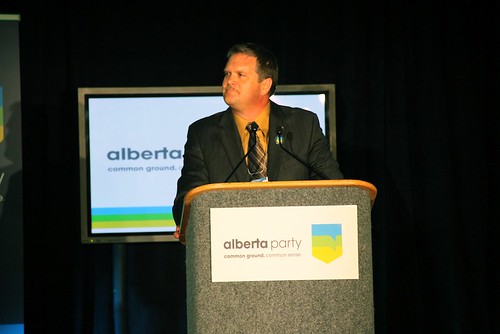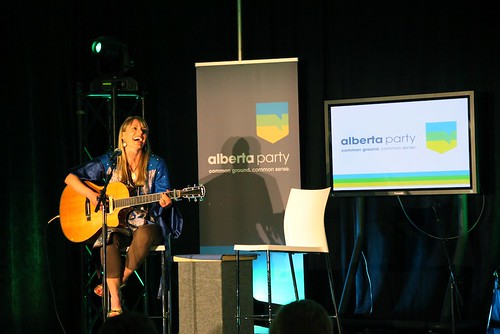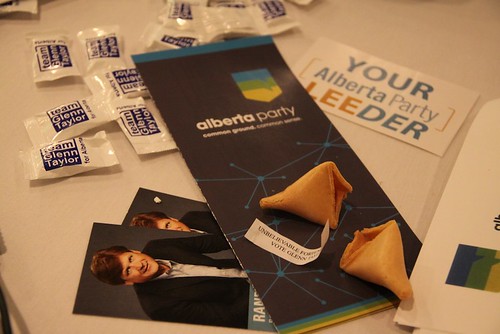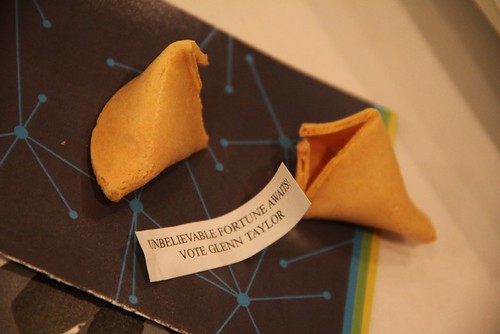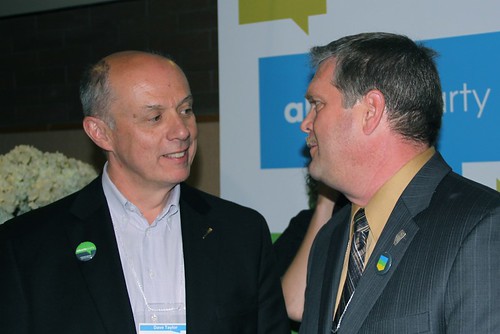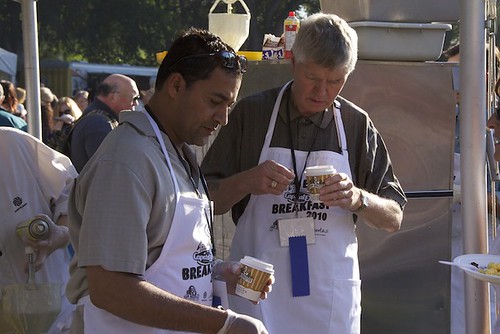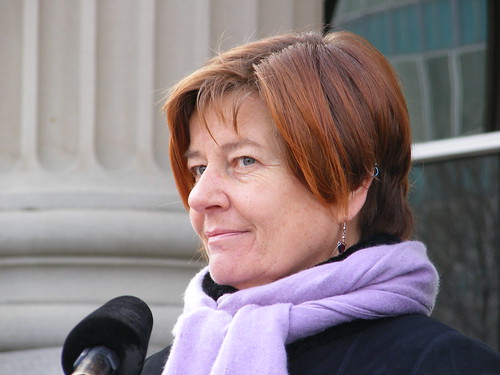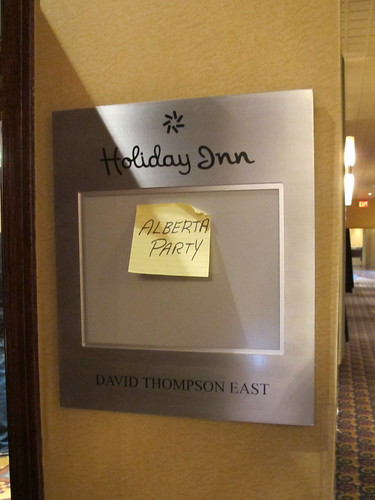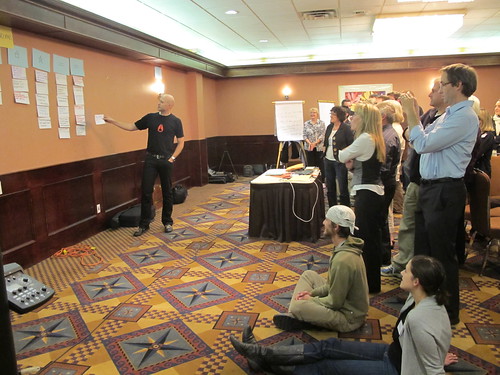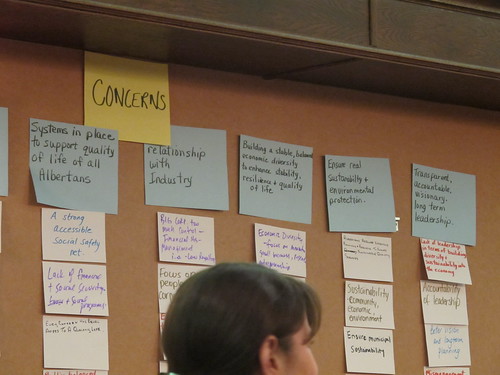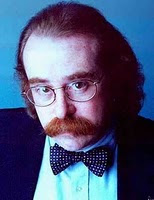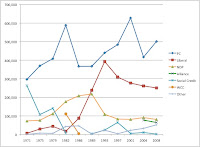This past year has been a fascinating one in Alberta politics. We have felt the rise of a new political opposition, witnessed more floor crossings than in decades, and a long-serving government that is trying desperately to find a direction. What have the changes in the past year meant for Alberta’s political players and what will it mean for them in 2011?
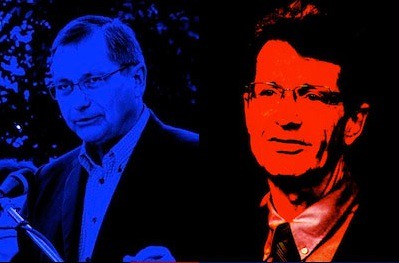 Progressive Conservatives
Progressive Conservatives
The challenges facing the PC Party on the eve of 2011 are similar to the challenges they faced a year ago. During the mid and late 1990s, the PCs were driven by an all-consuming desire to defeat the provincial deficit and debt. Once those goals were accomplished in the mid-2000s, the PCs lost their driving force. As in 2009, they continued to drift through 2010, without a defining purpose.
To say that the government was on auto-pilot in 2010 might be too generous a description because even that assumes that the ship is purposefully being steered in one direction. This is not to say that the PCs have driven Alberta into the ground. Alberta is still one of the most economically vibrant regions in Canada, but even the biggest optimist would admit that with a lack of strong leadership an institutional mediocrity has begun to define the leadership of Premier Ed Stelmach.
Protecting the reputation of the oil sands has become a raison d’aitre for many cabinet ministers, including Premier Stelmach and Environment Minister Rob Renner, but issues like health care have overshadowed these environmental issues on a domestic level. The firing of Alberta Health Services CEO Stephen Duckett along with a public shaming by the ER Doctors, and a very public battle with Edmonton-Meadowlark MLA Dr. Raj Sherman over Emergency Room wait-times turned the Tories to damage control mode late in 2010.
The PCs had initially hoped to turn health care as one of their positive stories of 2010 and promised one of the most important pieces of health care legislation in decades. The flagship Alberta Health Act was initially created to bring all health care laws under one piece of legislation, but once it made it to the Assembly floor, it was watered down to include a non-binding health charter and empowering the Health Minister to make more decisions in closed door cabinet meetings, rather than through Legislative votes.
In a number of year end interviews, Premier Stelmach has already begun managing expectations for 2011, stating that the provincial budget deficit may not be paid down until 2013, which creates an interesting political environment for an election expected in March 2012. The Premier has also stated that he will shuffle his cabinet in early 2011 in advance of the next election.
The next year will give the PCs an opportunity to mend some fences in their former stronghold of Calgary. The election of Mayor Naheed Nenshi in October 2010 could create a new cooperative tone between the Premier and the Mayor of Alberta’s largest city (a relationship that was not kind to the Premier when Dave Bronconnier was Mayor). If the PCs are unable to regain lost ground in Calgary, they might begin asking what, or who, caused their decline in support, and whether the reason responsible should be replaced.
Liberals
After being elbowed to the sideline by the growing narrative of the Wildrose Alliance as the next government-in-waiting in 2010, the Liberal Party’s biggest challenge in 2011 is to be relevant. Unable to defeat the PCs after 17 years as the Official Opposition, the Liberal Party has started to look and feel like yesterday’s opposition party.
The party has paid down its enormous debt and the caucus has released a series of new policies, but under David Swann‘s leadership the party has been unable to show any momentum as it slipped to third place in nearly every poll in 2010.
The departure of Calgary-Currie MLA Dave Taylor in April 2010 hurt the Liberals and I am told that many of the party’s traditional big donors in Edmonton are not pleased with the current leadership or Dr. Swann’s last minute appeal for cooperation with other opposition parties. With up to three of the party’s eight MLAs planning on retiring at the next election, the party is hoping to draw on a number of former MLAs defeated in the 2008 election to bolster its slate in the next election. Not exactly the sign of renewal that they will need to build momentum.
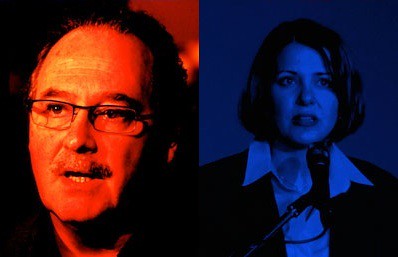
Wildrose Alliance
The past year has been a spectacular one for the Wildrose Alliance. With four MLAs, that party now has the third largest caucus in the Assembly, the most charismatic leader, Danielle Smith, a slew of staffers and organizers who have fled the PCs, a growing membership, and a group of 26 already nominated candidates knocking on doors across the province. The annual fundraising reports expected to be released by Elections Alberta in March 2011 will reveal another part of this party’s story in 2010 and will show if they will be able to compete with the PC Party’s multi-million dollar war chest.
The Wildrose Alliance is becoming more adept at using political wedge issues to draw out the weakness of the governing PCs. For example, where the PCs will never admit that they have ever attempted to increase privatization of our public health care system, the Wildrose Alliance is much more open with their desire to introduce private insurance and private providers (of course, their arguments around private health care delivery hit a bump in the road when they decided to defend the bankrupt Health Resource Centre in Calgary).
On the municipal front, Ms. Smith briefly entered the City Centre Airport redevelopment debate and received a stunning rebuke from Edmonton Mayor Stephen Mandel. While Ms. Smith’s entry into the debate does not appear to have helped that cause, it did give her party the opportunity to organize in their weakest region of the province (a maneuver that appears to have paid off).
A party cannot grow this fast without bumps along the road and the Wildrose has had a few. A few months ago, the entire Board of Directors of that party’s Little Bow Constituency Association resigned over allegations of central party interference in the nomination contest that selected Ian Donovan over Kevin Kinahan in November 2010. This week, the Board of Directors of the Medicine Hat Wildrose Constituency Association resigned over the acclamation of candidate Milvia Bauman.
New Democratic Party
The NDP are well… the NDP. The party’s two MLAs, Brian Mason and Rachel Notley, were vocal opponents in the Assembly this year and the party hosted a reasonably well-attended policy conference. The NDP Caucus released some positive policy this year, but rather than offering a constructive alternative to the current government the two MLAs fell back into the comfortable opposition attack-dog position.
The party shows very little signs of serious growth in the polls outside its traditional areas of support, but they are in a position to benefit from a weakened Liberal Party inside Edmonton’s city limits. Barring a change in leadership, which could see Ms. Notley or former MLA David Eggen step up, the NDP may have missed their window of opportunity to broaden their support beyond a handful of Edmonton constituencies a number of years ago.
Alberta Party
After the merger of the old Alberta Party with the Renew Alberta group in late 2009, the new Alberta Party has experienced huge growth.
Through the Big Listen process, the party attracted many disenchanted Tories, Liberals, New Democrats, former Greens, and independents to its ranks and has grown to nearly 1000 member in just one year. The party has been bolstered through the presidency of Chris Labossiere and in a smart move the party hired community organizer Michael Walters as their provincial organizer in Spring 2010. This still-growing party is expected to have over 40 constituency associations organized by the end of January 2011.
Acting Leader Sue Huff replaced leader Edwin Erickson in November 2010 and a full leadership contest will be launched in January 2011. A few potential candidates have already stepped up, including Hinton Mayor Glenn Taylor and Calgarian Chris Tesarski. The Alberta Party received a boost in public and media interest in October 2010, when many of its key organizers helped vault Naheed Nenshi to the Mayoralty in Calgary.
As an active member of this party, I see the Alberta Party’s big challenge of 2011 to move past the Big Listen to the next step of initiating some Big Action.







